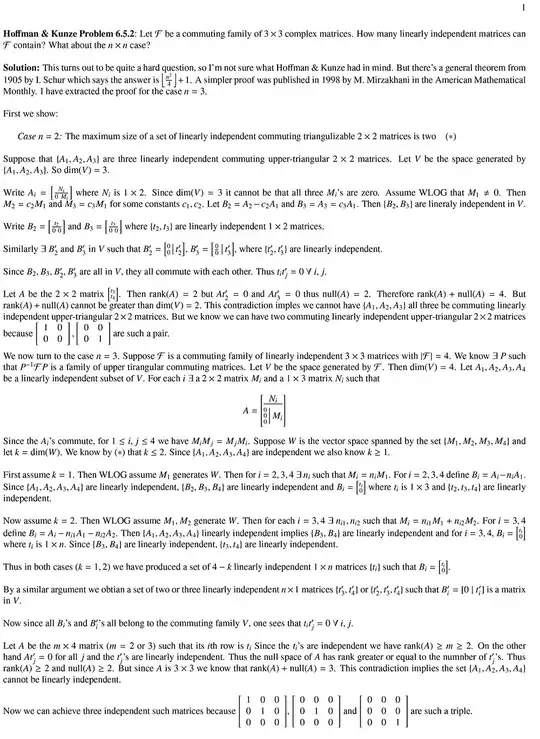Actual Question is:
Let $\mathcal{F}$ be a commuting family of $3\times 3$ complex matrices. How many linearly independent matrices can $\mathcal{F}$ contain? what about the $n\times n$ case? (Hoffman Kunzze, Linear algebra, 6.5.2)
I have no idea ow to go directly for $n\times n$.. SO, I thought i would try for $2\times 2$ and $3\times 3$ and then generalize.
For $2\times 2$ I know that basis of $\mathcal{M_2}=\{2\times 2 ~complex ~ matrices\}$ is $ \left( \begin{array}{cccc} 1 & 0 \\ 0 & 0 \end{array} \right),\left( \begin{array}{cccc} 0 & 1 \\ 0 & 0 \end{array} \right),\left( \begin{array}{cccc} 0 & 0 \\ 1 & 0 \end{array} \right) ,\left( \begin{array}{cccc} 0 & 0 \\ 0 & 1 \end{array} \right) $
So, what i was thinking is if i can check which matrices commutes in this connection, this would be the linearly independent commuting sets of $2\times 2$ matrices ( this is my guess not very sure)
we have $ \left( \begin{array}{cccc} 1 & 0 \\ 0 & 0 \end{array} \right)\left( \begin{array}{cccc} 0 & 1 \\ 0 & 0 \end{array} \right)= \left( \begin{array}{cccc} 0 & 1 \\ 0 & 0 \end{array} \right)$ but, $ \left( \begin{array}{cccc} 1 & 0 \\ 0 & 0 \end{array} \right)\left( \begin{array}{cccc} 0 & 1 \\ 0 & 0 \end{array} \right)=\left( \begin{array}{cccc} 0 & 0 \\ 0 & 0 \end{array} \right)$
i dont want to write all other combinations, but, i would write only commuting matrices
$\left( \begin{array}{cccc} 1 & 0 \\ 0 & 0 \end{array} \right)\left( \begin{array}{cccc} 0 & 0 \\ 0 & 1 \end{array} \right)=\left( \begin{array}{cccc} 0 & 0 \\ 0 & 0 \end{array} \right)$ and $\left( \begin{array}{cccc} 0 & 0 \\ 0 & 1 \end{array} \right)\left( \begin{array}{cccc} 1 & 0 \\ 0 & 0 \end{array} \right)=\left( \begin{array}{cccc} 0 & 0 \\ 0 & 0 \end{array} \right)$
So, I think these two elements must be linearly independent in the set of commuting $2\times 2$ matrices.
I am expecting to do the same for general $n\times n$ but this would be cumbersome..
So, I would be thankful if some one can help me out to solve this in detail... atleast for $2\times 2$ ...
Thank You.
